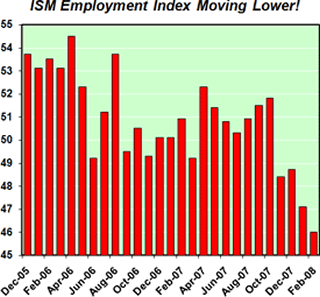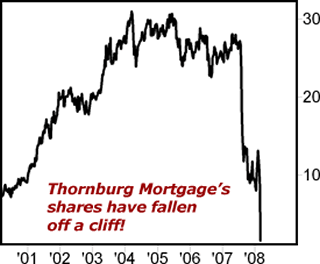US Mortgage and Housing Markets at Very Important Crossroads
Housing-Market / US Housing Mar 07, 2008 - 01:19 PM GMT  Mike Larson writes: The most amazing thing about the housing and mortgage market crunch is that it has unfolded in the context of a decent employment backdrop and a growing economy.
Mike Larson writes: The most amazing thing about the housing and mortgage market crunch is that it has unfolded in the context of a decent employment backdrop and a growing economy.
Home sales collapsed ... inventories ballooned ... prices started dropping ... and mortgage delinquency rates and foreclosures exploded.
All this DESPITE the fact the unemployment rate was falling (to a low of 4.4% in early 2007) and gross domestic product was steadily rising (at quarterly rates of as high as 4.9% in Q3 2007).
The computer models that many lenders and ratings agencies relied on said this couldn't happen. That's one reason the depth of the housing and mortgage market meltdown caught Wall Street by surprise. As a newsletter put out by the Dallas Fed noted in late 2007 :
"Subprime loan problems had surfaced just before and at the start of the 2001 recession but then rapidly retreated from 2002 to 2005 as the economy recovered. This pre-2006 pattern suggested that as long as unemployment remained low, so, too, would default and delinquency rates.
"This interpretation ignored two other factors that had helped alleviate subprime loan problems earlier in the decade. First, this was a period of rapidly escalating home prices. Subprime borrowers who encountered financial problems could either borrow against their equity to make house payments or sell their homes to settle their debts. Second, interest rates declined significantly in the early 2000s. This helped lower the base rate to which adjustable mortgage rates were indexed, thereby limiting the increase when initial, teaser rates ended.
"Favorable home-price and interest rate developments likely led models that were overly focused on unemployment as a driver of problem loans to underestimate the risk of nonprime mortgages ... When the favorable home-price and interest rate factors reversed, the past-due rate rose markedly, despite continued low unemployment."
Why do I bring this up?
Because the Housing and Mortgage Markets Are At a Very Critical Crossroads
Up until very recently, the vast majority of the mortgage market's problems were driven by the "private recession" in housing. The rest of the economy, particularly those sectors tethered to strong global growth, chugged along just fine. That prevented a broad-based rise in unemployment, with all its ramifications for credit quality.
Now, we may be losing that prop ...
- The unemployment rate is starting to rise off its low, hitting 4.9% in January. Job creation in many sectors is grinding to a halt, while other sectors are seeing outright declines.
- A private report from ADP Employer Services estimated that the economy lost 23,000 jobs in February, the worst reading since April 2003.
- An employment index that measures manufacturing sector hiring fell to 46 last month, the lowest in almost five years. Another index showed service-sector hiring is running around the lowest levels since 2002 (despite a small bounce last month).
Anything can happen when the "official" Labor Department figures come out this morning. But the big-picture trend looks unmistakable to me: We are now dealing with rising unemployment, more job losses, and declining incomes.

That's the last thing mortgage lenders need to deal with. After all, loan performance is already downright awful:
Fresh figures from the Mortgage Bankers Association show the late payment rate on U.S. home loans jumped to 5.82% in the fourth quarter of last year. That's up from 4.95% a year earlier and the highest since 1985.
Even worse, 2.04% of U.S. mortgages are now in some stage of foreclosure. That's roughly double the levels of a year and a half ago, and the highest in U.S. history!
If you read the New York Times on Wednesday, you were greeted with the following headline: "Bush and Fed Step Toward a Mortgage Rescue."
The gist of the piece:
"However much they might oppose it on ideological grounds, the Bush administration and the Federal Reserve are inching closer toward a government rescue of distressed homeowners and mortgage lenders.
"Ben S. Bernanke, the Fed chairman, told a group of bankers in Florida on Tuesday that 'more can and should be done' to help millions of people with mortgages that are often bigger than the value of their homes.
"Though Mr. Bernanke stopped well short of calling for a government bailout, he used his bully pulpit to try to push the banking industry into forgiving portions of many mortgages and signaled his concern that market forces would not be enough to prevent a broader economic calamity.
"He also suggested that the Federal Housing Administration expand its insurance program to let more people switch from expensive subprime mortgages to federally insured loans.
"And he urged the two government-sponsored mortgage companies, Fannie Mae and Freddie Mac, to raise more capital so they could buy more mortgages. The companies already guarantee or hold as investments about $1.5 trillion in mortgages."
I've talked before about the potential problems with dumping more mortgage risk on the laps of Fannie Mae, Freddie Mac, and the FHA.
Chief among them: That taxpayers, rather than private lenders, could end up footing the bill for the NEXT downturn that we'll inevitably see, even if it's years down the road.
And I've made clear that lower home prices are part of the housing market SOLUTION , not the problem — as painful as they might be in the shorter-term both for borrowers and lenders.
Why? Because falling prices will allow new home buyers with average incomes to purchase typical homes with traditional mortgages instead of the "Frankenstein Financing" that became so popular in the past few years.
But I'm also a realist. I recognize there is NO WAY that Washington is going to sit idly by while millions of borrowers get thrown out of their homes and home prices continue to slump. So I've tried to be constructive — both here and at my blog — about which bailout and reform ideas make sense to me, and which don't.
I believe we're still facing at least one more disappointing spring home buying season. I also expect credit problems will continue to hamper the banking and financial sector. And I think the jobs news will get worse before it gets better.
Moreover, we keep getting hit by "tape bombs" — crises that pop up out of the blue in the mortgage world.

Example #1: Thornburg Mortgage announced that it received a default notice from JPMorgan Chase after it failed to meet a margin call. The notice was on a $320 million loan; the call was for $28 million. That triggered a fresh plunge in Thornburg shares. They traded all the way down to $1.26 yesterday, down 83% this year alone. Thornburg makes and invests in generally well-performing jumbo loans.
Example #2: The mortgage bond fund Carlyle Capital Corp. announced that it missed four out of seven margin calls totaling more than $37 million. The fund uses a heap of leverage to invest in AAA agency mortgage bonds (bundles of mortgages backed by Fannie Mae and Freddie Mac). But the value of those bonds has been falling due to forced selling and increasing market concerns about mortgage credit quality.
These are the kinds of things that wreck confidence and drive financing costs even higher.
Bottom line: It's still a turbulent market environment in the here and now. As for the longer term outlook, I'm definitely keeping a close eye on the latest employment data AND the regulatory and legislative action in D.C.
After all, it will likely be some combination of improving employment conditions and stronger intervention efforts that ultimately help turn the tide in housing.
Until next time,
Mike
This investment news is brought to you by Money and Markets . Money and Markets is a free daily investment newsletter from Martin D. Weiss and Weiss Research analysts offering the latest investing news and financial insights for the stock market, including tips and advice on investing in gold, energy and oil. Dr. Weiss is a leader in the fields of investing, interest rates, financial safety and economic forecasting. To view archives or subscribe, visit http://www.moneyandmarkets.com .
Money and Markets Archive |
© 2005-2022 http://www.MarketOracle.co.uk - The Market Oracle is a FREE Daily Financial Markets Analysis & Forecasting online publication.



